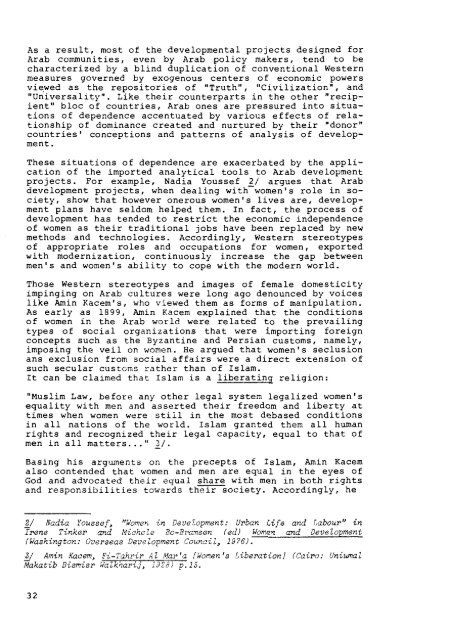Ifda dossier 47, May/June 1985
Ifda dossier 47, May/June 1985
Ifda dossier 47, May/June 1985
You also want an ePaper? Increase the reach of your titles
YUMPU automatically turns print PDFs into web optimized ePapers that Google loves.
As a result, most of the developmental projects designed for<br />
Arab communities, even by Arab policy makers, tend to be<br />
characterized by a blind duplication of conventional Western<br />
measures governed by exogenous centers of economic powers<br />
viewed as the repositories of "Truth", "Civilization", and<br />
"Universality". Like their counterparts in the other "recip-<br />
ient" bloc of countries, Arab ones are pressured into situa-<br />
tions of dependence accentuated by various effects of rela-<br />
tionship of dominance created and nurtured by their "donor"<br />
countries' conceptions and patterns of analysis of develop-<br />
ment.<br />
These situations of dependence are exacerbated by the appli-<br />
cation of the imported analytical tools to Arab development<br />
projects. For example, Nadia Youssef 2/ argues that Arab<br />
development projects, when dealing with women's role in so-<br />
ciety, show that however onerous women's lives are, develop-<br />
ment plans have seldom helped them. In fact, the process of<br />
development has tended to restrict the economic independence<br />
of women as their traditional jobs have been replaced by new<br />
methods and technologies. Accordingly, Western stereotypes<br />
of appropriate roles and occupations for women, exported<br />
with modernization, continuously increase the gap between<br />
men's and women's ability to cope with the modern world.<br />
Those Western stereotypes and images of female domesticity<br />
impinging on Arab cultures were long ago denounced by voices<br />
like Amin Kacem's, who viewed them as forms of manipulation.<br />
As early as 1899, Amin Kacem explained that the conditions<br />
of women in the Arab world were related to the prevailing<br />
types of social organizations that were importing foreign<br />
concepts such as the Byzantine and Persian customs, namely,<br />
imposing the veil on women. He argued that women's seclusion<br />
ans exclusion from social affairs were a direct extension of<br />
such secular customs rather than of Islam.<br />
It can be claimed that Islam is a liberatinq religion:<br />
"Muslim Law, before any other legal system legalized women's<br />
equality with men and asserted their freedom and liberty at<br />
times when women were still in the most debased conditions<br />
in all nations of the world. Islam granted them all human<br />
rights and recognized their legal capacity, equal to that of<br />
men in all matters..." - 3/.<br />
Basing his arguments on the precepts of Islam, Amin Kacem<br />
also contended that women and men are equal in the eyes of<br />
God and advocated their equal share with men in both riqhts<br />
and responsibilities towards their society. Accordingly, he<br />
2/ {India Youssef, "Worner, in Development: Urban Life and Labour" in<br />
Irene Tinker and Michcle Bo-Brunsen fed) Women and DeveZopment<br />
(Washington: Overseas Development Council, 1976).<br />
3/ Amin Kacem, Fi-Tahrir Al Mar 'a [Words Liberation] (Cairo: Unizanal<br />
nakatib Bismisr Walkhar-ij, 1328^ p. 15.
















